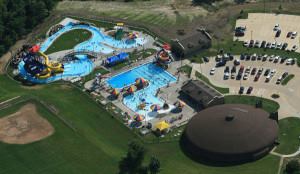Could violating state pool regulations constitute a criminal offense? Iowa Supreme Court justices recently ruled that it can.
The late-June ruling clears the way for the families of two boys who drowned in a municipal pool to pursue a civil wrongful death case against the city of Pella, which had, until this point, been statutorily immune to any legal claims resulting from swimming pool accidents.
The court’s decision stems from a tragedy that occurred on July 14, 2010, when a lifeguard discovered Nehmson Sanon, 15, and Gael Chrispin, 14, lifeless at the bottom of a pool at the Pella Aquatic Center. The boys drowned during an after-hours summer camp event organized by the Fellowship of Christian Athletes, according to a court document.
Pool operators did not turn on the underwater lights during the nighttime event, which attracted around 175 campers. The overhead lights on the site failed to meet state code, a court document states.
The two boys disappeared into dark, murky water after going down a water slide. No one — not the lifeguards, counselors or campers — noticed that Sanon and Chrispin were missing until long after the pool was cleared.
It turns out that at least one city official personally considered the Pella Aquatic Center unsuitable for nighttime use before the incident occurred. Less than two years after opening to the public in July 2004, the city discovered numerous defects with the electrical system and filed a lawsuit against the contractor, Central Electrical Co. The case dragged on for years. During that time, the city’s aquatics manager, Jan Bensink, and community services director, Kevin Vos, determined that the underwater lights should no longer be used.
In preparation for the trial against CEC, the city retained experts to testify about the pool’s lighting conditions. One of them, an architectural engineer named Michael Fisher, prepared a report for the city dated March 3, 2009 — 16 months before the deaths of Sanon and Chrispin — stating that overhead lights alone were not sufficient.
Coincidently, the city’s lawsuit against CEC was tried on July 14, 2010, the day Sanon and Chrispin died. Two days prior, Vos, who was in charge of the pool at the time, testified that he would not allow his own children to swim in the pool at night.
Murky water also contributed to poor visibility in the pool. “On the evening of the FCA pool party, the water became so cloudy, such that — at some point — the main drain at the bottom of the deep end of the pool was not visible from the pool deck,” a court document states.
Despite these facts, the plaintiffs did not have a slam-dunk case against the city. Sanon’s parents, Roselene and Nemi Sanon, and Paulette Cezil Pogue, mother of Chrispin, ran into an unusual legal roadblock: A district court judge dismissed the case based on Iowa code, section 670.4, which provides city-owned swimming pools immunity from liability.
There is an exception, however: If an act or omission on the part of a city official or employee constitutes a criminal offense, the plaintiffs then could pursue a case.
That’s how the Iowa Supreme Court got involved. Ultimately, the justices ruled there were enough facts that a jury could reasonably find the city responsible for the boys’ deaths.
This was not a decision or comment on the city’s liability. Instead, the justices ruled whether the case as presented so far met a certain standard of viability and could move forward. And, to be clear, no criminal charges are being pressed against the city.
“It’s just peculiar language that we have in our immunity statute that says we basically have to prove that there was — in order to get around the immunity — an act or omission that constituted a criminal offense,” said Thomas Duff, the plaintiffs’ attorney.
In this case, the criminal offense could be involuntary manslaughter, a misdemeanor. The next step is to try to prove in district court that Sanon and Chrispin drowned as a result of the city’s negligence. However, Duff hopes to settle the case before it goes to trial.
“It’s been painfully slow,” he said. “That’s why we’re trying to resolve this.”
The Fellowship of Christian Athletes also is listed as a defendant. According to court documents, parents were supposed to sign waivers indicating whether their children could swim. The parents had indicated that Sanon and Chrispin could not. However, counselors forgot to bring the waivers with them the night they all went swimming.
The city of Pella did not return a call for comment.



